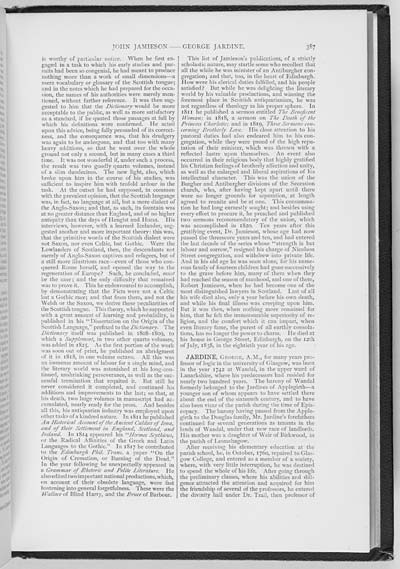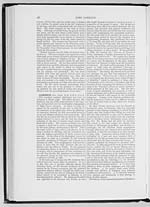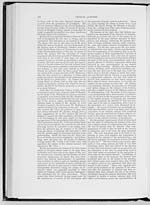387
is worthy of particular notice. When he first en-
gaged in a task to which his early studies and pur-
suits had been so congenial, he had meant to produce
nothing more than a work of small dimensions�a
mere vocabulary or glossary of the Scottish tongue;
and in the notes which he had prepared for the occa-
sion, the names of his authorities were merely men-
tioned, without further reference. It was then sug-
gested to him that the Dictionary would be more
acceptable to the public, as well as more satisfactory
as a standard, if he quoted those passages at full by
which his definitions were confirmed. He acted
upon this advice, being fully persuaded of its correct-
ness, and the consequence was, that his drudgery
was again to be undergone, and that too with many
heavy additions, so that he went over the whole
ground not only a second, but in many cases a third
time. It was not wonderful if, under such a process,
the result was two goodly quarto volumes, instead
of a slim duodecimo. The new light, also, which
broke upon him in the course of his studies, was
sufficient to inspire him with tenfold ardour in the
task. At the outset he had supposed, in common
with the prevalent opinion, that the Scottish language
was, in fact, no language at all, but a mere dialect of
the Anglo-Saxon; and that, as such, its fountain was
at no greater distance than England, and of no higher
antiquity than the days of Hengist and Horsa. His
interviews, however, with a learned Icelander, sug-
gested another and more important theory: this was,
that the primitive words of the Scottish dialect were
not Saxon, nor even Celtic, but Gothic. Were the
"Lowlanders of Scotland, then, the descendants not
merely of Anglo-Saxon captives and refugees, but of
a still more illustrious race�even of those who con-
quered Rome herself, and opened the way to the
regeneration of Europe? Such, he concluded, must
be the case; and the only difficulty that remained
was to prove it. This he endeavoured to accomplish,
by demonstrating that the Picts were not a Celtic
but a Gothic race; and that from them, and not the
Welsh or the Saxon, we derive these peculiarities of
the Scottish tongue. This theory, which he supported
with a great amount of learning and probability, is
published in his "Dissertation on the Origin of the
Scottish Language," prefixed to the Dictionary. The
Dictionary itself was published in 1808-1809, to
which a Supplement, in two other quarto volumes,
was added in 1825, As the first portion of the work
was soon out of print, he published an abridgment
of it in 1818, in one volume octavo. All this was
an immense amount of labour for a single mind, and
the literary world was astonished at his long-con-
tinued, unshrinking perseverance, as well as the suc-
cessful termination that requited it. But still he
never considered it completed, and continued his
additions and improvements to the last; so that, at
his death, two large volumes in manuscript had ac-
cumulated, nearly ready for the press. And besides
all this, his antiquarian industry was employed upon
other tasks of a kindred nature. In 1811 he published
An Historical Account of the Ancient Citldees of Iona,
and of their Settlement in England, Scotland, and
Ireland. In 1814 appeared his "Hermes Scythicus,
or the Radical Affinities of the Greek and Latin
Languages to the Gothic." In 1817 he contributed
to the Edinburgh Phil. Trans, a paper "On the
Origin of Cremation, or Burning of the Dead."
In the year following he unexpectedly appeared in
a Grammar of Rhetoric and Polite Literature. He
also edited two important national productions, which,
on account of their obsolete language, were fast
hastening into general forgetfulness. These were the
Wallace of Blind Harry, and the Bruce of Barbour.
This list of Jamieson's publications, of a strictly
scholastic nature, may startle some who recollect that
all the while he was minister of an Antiburgher con-
gregation; and that, too, in the heart of Edinburgh.
How were his clerical duties fulfilled, and his people
satisfied? But while he was delighting the literary
world by his valuable productions, and winning the
foremost place in Scottish antiquarianism, he was
not regardless of theology as his proper sphere. In
1811 he published a sermon entitled The Beneficent
Woman; in 1818, a sermon on The Death of the
Princess Charlotte; and in 1819, Three Sermons con-
cerning Brotherly Love. His close attention to his
pastoral duties had also endeared him to his con-
gregation, while they were proud of the high repu-
tation of their minister, which was thrown with a
reflected lustre upon themselves. An event also
occurred in their religious body that highly gratified
his Christian feelings of brotherly affection and unity,
as well as the enlarged and liberal aspirations of his
intellectual character. This was the union of the
Burgher and Antiburgher divisions of the Secession
church, who, after having kept apart until there
were no longer grounds for separation, at length
agreed to reunite and be at one. This consumma-
tion he had long earnestly sought; and besides using
every effort to procure it, he preached and published
two sermons recommendatory of the union, which
was accomplished in 1820. Ten years after this
gratifying event, Dr. Jamieson, whose age had now
passed the threescore years and ten, and had entered
the last decade of the series whose "strength is but
labour and sorrow," resigned his charge of Nicolson
Street congregation, and withdrew into private life.
And in his old age he was soon alone, for his nume-
rous family of fourteen children had gone successively
to the grave before him, many of them when they
had reached the season of manhood, and one of them,
Robert Jamieson, when he had become one of the
most distinguished lawyers in Scotland. Last of all
his wife died also, only a year before his own death,
and while his final illness was creeping upon him.
But it was then, when nothing more remained for
him, that he felt the immeasurable superiority of re-
ligion, and the comfort which it can impart, when
even literary fame, the purest of all earthly consola-
tions, has no longer the power to charm. He died at
his house in George Street, Edinburgh, on the I2th
of July, 1838, in the eightieth year of his age.
JARDINE, GEORGE, A.M., for many years pro-
fessor of logic in the university of Glasgow, was born
in the year 1742 at Wandal, in the upper ward of
Lanarkshire, where his predecessors had resided for
nearly two hundred years. The barony of Wandal
formerly belonged to the Jardines of Applegirth�a
younger son of whom appears to have settled there
about the end of the sixteenth century, and to have
also been vicar of the parish during the time of Epis-
copacy. The barony having passed from the Apple-
girth to the Douglas family, Mr. Jardine's forefathers
continued for several generations as tenants in the
lands of Wandal, under that new race of landlords.
His mother was a daughter of Weir of Birkwood, in
the parish of Lesmahagow.
After receiving his elementary education at the
parish school, he, in October, 1760, repaired to Glas-
gow College, and entered as a member of a society,
where, with very little interruption, he was destined
to spend the whole of his life. After going through
the preliminary classes, where his abilities and dili-
gence attracted the attention and acquired for him
the friendship of several of the professors, he entered
the divinity hall under Dr. Trail, then professor of

![]() Universal Viewer |
Universal Viewer | ![]() Mirador |
Large image | Transcription
Mirador |
Large image | Transcription
![]()

